Turkey has a rich culinary history, with a diverse range of traditional foods that have been enjoyed over the centuries. The history of food in Turkey can be traced back to the early settlers who relied on a hunter-gatherer lifestyle to survive. As they transitioned to a settled life, agriculture became prevalent, leading to the domestication of animals and plants. The Middle East played a crucial role in the initiation of agriculture, and trade routes helped spread food culture to various regions. Turkish cuisine is known for its reliance on agricultural products and meat, with different regions offering unique dishes.
Key Takeaways
- Turkey has a diverse range of traditional foods influenced by its rich culinary history.
- The early settlers relied on a hunter-gatherer lifestyle before transitioning to agriculture.
- The Middle East and trade routes played a crucial role in spreading food culture in Turkey.
- Turkish cuisine is characterized by its reliance on agricultural products and meat.
- Each region in Turkey offers unique dishes showcasing local flavours and ingredients.
The Origins of Turkish Cuisine
Turkish food history dates back centuries, steeped in a rich culinary culture that has evolved through a blend of influences. The origins of Turkish cuisine can be traced to a combination of trade, immigration, and cultural engagements with different regions. With the acceptance of Islam, Turkish food culture underwent a transformation, incorporating flavours from Europe, the Middle East, and Africa.
Turkey’s geographical location played a crucial role in shaping its culinary heritage. As a crossroads between Europe and Asia, the country became a melting pot of culinary traditions from various cultures. The Ottoman Empire, which spanned from the 14th to the early 20th century, further enriched Turkish cuisine by introducing new ingredients and cooking techniques.
“Turkish cuisine is a reflection of the country’s diverse history and cultural influences. It is one of the oldest and most important cuisines in the world, with a culinary heritage dating back thousands of years.”
Throughout history, Turkish culinary heritage has been passed down through generations, preserving authentic flavours and techniques. Regional variations also contribute to the diversity of Turkish cuisine, with each area offering its own unique dishes and ingredients. From the vibrant flavours of the Mediterranean coast to the hearty dishes of the Anatolian heartland, Turkish cuisine offers a tantalizing fusion of tastes and aromas.
Understanding the origins of Turkish cuisine provides a deeper appreciation for the culinary traditions that have shaped the country’s food culture. From its humble beginnings influenced by trade routes to the grandeur of the Ottoman Empire, Turkish cuisine continues to evolve and delight gastronomes around the world.
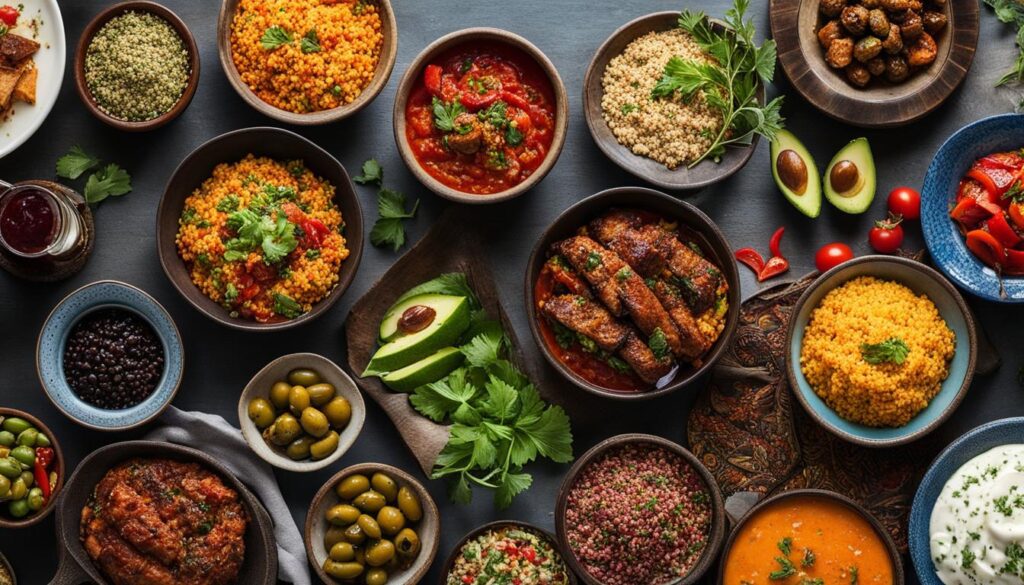
Traditional Foods of Turkey
Turkey is renowned for its diverse and mouthwatering traditional dishes that have been passed down through generations. These authentic Turkish foods offer a delightful blend of flavours, textures, and cultural influences. From hearty kebabs to savoury pastries and sweet desserts, the traditional cuisine of Turkey is a true reflection of the country’s rich culinary heritage.
Popular Traditional Turkish Dishes
One of the most iconic dishes in Turkish cuisine is the kebab. Made from succulent pieces of marinated meat, kebabs are grilled to perfection, resulting in a smoky and flavorful dish. Another beloved traditional food in Turkey is börek, a savoury pastry filled with ingredients like cheese, spinach, or meat. Börek is known for its flaky and buttery pastry, making it a favourite snack or breakfast option.
Dolma is another traditional Turkish dish that is widely enjoyed. It consists of vegetables such as peppers, zucchini, or grape leaves stuffed with a flavorful mixture of rice, spices, and sometimes ground meat. The dolma are then cooked and served either hot or cold, making it a versatile and delicious dish.
A true Turkish feast is incomplete without pilaf, a fragrant rice dish cooked with various ingredients such as vegetables, meat, or dried fruits. The combination of aromatic spices and tender rice creates a comforting and satisfying meal. And for those with a sweet tooth, baklava is a must-try dessert. Made with layers of thin pastry, nuts, and sweet syrup, baklava is a rich and indulgent treat that showcases the artistry of Turkish pastry-making.
| Traditional Turkish Dish | Description |
|---|---|
| Kebab | A grilled dish made with marinated meat |
| Börek | A savoury pastry filled with ingredients like cheese or meat |
| Dolma | Vegetables stuffed with a mixture of rice, spices, and sometimes meat |
| Pilaf | A fragrant rice dish cooked with various ingredients |
| Baklava | A sweet pastry made with layers of thin dough, nuts, and syrup |
These traditional Turkish dishes are not only delicious but also showcase the country’s culinary traditions and cultural heritage. Each bite is a journey through history, as the flavours and techniques have been perfected over centuries. Whether enjoying a kebab with friends, savouring the delicate layers of baklava, or indulging in the comforting flavours of pilaf, traditional Turkish foods offer a truly unforgettable gastronomic experience.
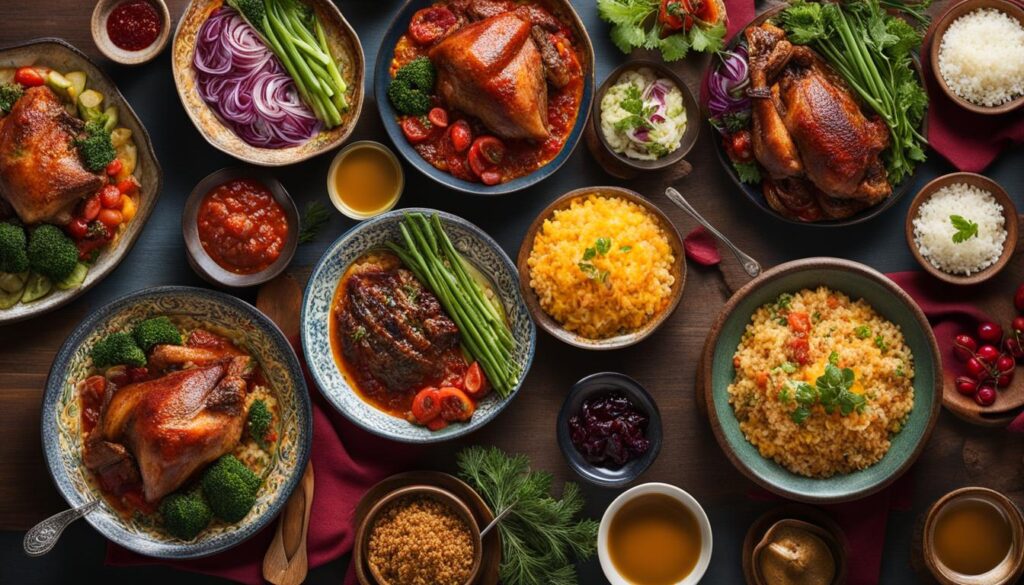
“The rich flavors and diverse range of traditional Turkish dishes are a testament to the country’s culinary heritage and the creativity of its people.” – Food critic
Festive Foods in Turkey
Turkey is renowned for its vibrant culinary traditions, and one aspect that stands out is its festive foods. During special occasions and holidays, Turkish people come together to celebrate with mouth-watering dishes that hold cultural significance. These festive foods offer a delicious taste of tradition and are an integral part of Turkish culinary heritage.
One popular festive dish in Turkey is İskender kebab, a delectable combination of grilled meat served over bread and topped with tomato sauce and yoghurt. This flavorful dish is often enjoyed during festive gatherings, adding a touch of indulgence to the celebrations. Another beloved festive food is işkembe çorbası, a tripe soup that is traditionally consumed during New Year’s Eve festivities. The rich and comforting flavours of this soup bring warmth and joy to the occasion.
These festive foods not only tantalize the taste buds but also serve as symbols of cultural traditions in Turkey. They bring people together, fostering a sense of unity and celebration. Festive foods in Turkey are an expression of joy and gratitude, honouring the traditions that have been passed down through generations.
Table: Traditional Turkish Festive Foods
Below is a table highlighting some traditional festive foods in Turkey:
| Festive Food | Description |
|---|---|
| İskender Kebab | A dish made with grilled meat served over bread and topped with tomato sauce and yoghurt. |
| İşkembe Çorbası | A tripe soup often consumed during New Year’s Eve celebrations. |
| Baklava | A sweet pastry made of layers of filo filled with nuts and sweetened with syrup. |
| Lokma | Deep-fried dough balls soaked in syrup and sprinkled with cinnamon. |
| Sütlaç | A creamy rice pudding flavoured with vanilla and topped with cinnamon. |
These festive foods capture the essence of Turkish cuisine, offering a blend of flavours and textures that delight the senses. They reflect the diversity and cultural richness of Turkey, making every festive occasion truly special.

Modern Gastronomic Landscapes in Turkey
Turkey’s culinary scene has taken a bold leap into the modern world with the emergence of innovative gastronomic landscapes. This fusion of traditional Turkish flavours and contemporary techniques has created a new wave of exciting and diverse cuisine that appeals to both locals and international visitors. From upscale restaurants to trendy food trucks, the modern Turkish food scene offers something for every palate.
The concept of fusion cuisine has been embraced wholeheartedly in Turkey, resulting in a delightful blend of flavours from different cultures. Turkish chefs are incorporating international ingredients and cooking techniques into their dishes, creating unique and unexpected taste experiences. Whether it’s a traditional Turkish dish with a modern twist or a completely new creation inspired by global flavours, the modern gastronomic landscapes of Turkey are pushing boundaries and taking culinary innovation to new heights.
“The fusion of traditional Turkish flavors and contemporary techniques has created a new wave of exciting and diverse cuisine.”
Turkish gastronomy has gained recognition on the global stage, with renowned chefs putting a spotlight on the country’s culinary heritage. Their creative interpretations of traditional dishes have garnered attention and accolades, solidifying Turkey’s position as a gastronomic destination. The use of local ingredients, combined with modern cooking methods, has elevated Turkish cuisine to a whole new level of sophistication.
For food enthusiasts and adventurous palates, exploring the modern gastronomic landscapes in Turkey is a must. From bustling food markets to trendy restaurants, there’s no shortage of culinary delights to discover. So indulge in the contemporary Turkish food scene and savour the unique flavours that embody the spirit of modern Turkish cuisine.
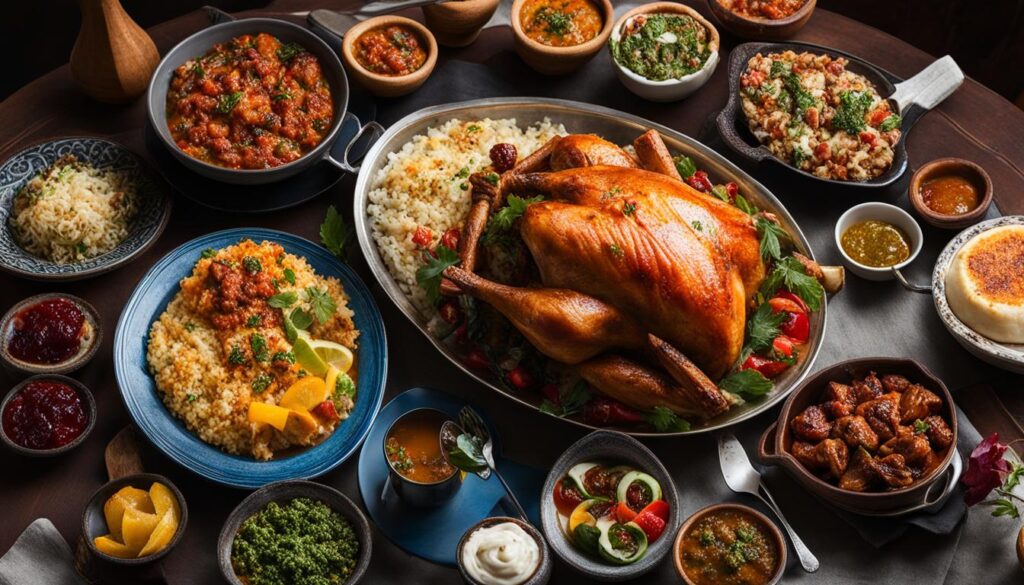
Fusion Cuisine: A Celebration of Flavors
Fusion cuisine in Turkey is a celebration of flavours, blending traditional Turkish ingredients with international influences. This culinary trend embraces diversity and creativity, resulting in dishes that are both familiar and new. Chefs experiment with contrasting flavours and textures, bringing together the best of both worlds to create a harmonious and memorable dining experience.
Exploring New Techniques and Presentations
Contemporary Turkish food is not just about the fusion of flavours; it also explores new cooking techniques and artistic presentations. Chefs push the boundaries of traditional cooking methods, incorporating modern tools and technologies to elevate their dishes. The visual appeal of the food is just as important as the taste, with chefs creating edible masterpieces that are a feast for the eyes.
A Global Perspective on Turkish Cuisine
The modern gastronomic landscapes in Turkey have put Turkish cuisine on the global map. Restaurants and chefs in major cities like Istanbul and Ankara are gaining international recognition for their innovative approach to traditional Turkish dishes. This global perspective on Turkish cuisine not only attracts food enthusiasts but also contributes to the country’s tourism industry, as travellers seek out unique culinary experiences.
The Significance of Local Cuisine in Turkey
Local cuisine in Turkey plays a significant role in both the cultural identity of different regions and the country’s tourism sector. Each region in Turkey has its own unique culinary traditions, reflecting the local ingredients and cultural influences. Tourists often explore different destinations in Turkey to experience the authentic flavours of local foods. The diversity of Turkish regional cuisine adds to the overall richness of the country’s culinary landscape.
From the vibrant spices of the East to the hearty dishes of the Aegean and Mediterranean coasts, Turkish regional cuisine offers a delightful array of flavours and culinary experiences. In the bustling markets and small villages, local ingredients take centre stage, with dishes showcasing the bounty of the surrounding land and sea. From freshly caught fish grilled to perfection on the Aegean coast to succulent lamb kebabs in the mountainous regions, each bite tells a story of tradition and heritage.
The Culinary Treasures of Istanbul
While Turkey’s regional cuisine is diverse and intriguing, the bustling metropolis of Istanbul deserves special mention. As a melting pot of cultures and influences, Istanbul’s culinary scene is a vibrant tapestry of flavours. From the iconic street food of the city’s bustling bazaars to the elegant spreads of meze (appetizers) at traditional taverns, Istanbul offers a dynamic culinary experience.
The significance of local cuisine in Turkey extends beyond mere sustenance. It is a celebration of heritage, a reflection of the country’s cultural diversity, and a testament to the deep connection between food and identity. Whether indulging in the aromatic spices of Gaziantep’s cuisine or savouring the seafood delights of the Aegean, exploring local cuisine in Turkey is a journey that tantalizes the taste buds and nourishes the soul.

Famous Turkish Food Dishes
Turkey is renowned for its famous dishes that have gained popularity both within the country and internationally. These iconic Turkish food dishes showcase the rich culinary heritage and diverse flavours of the region. From savoury kebabs to delectable pastries, here are some of the most famous Turkish dishes that have captured the hearts and taste buds of food enthusiasts worldwide.
Döner Kebab
The döner kebab is a true Turkish classic and one of the most popular Turkish foods. It consists of succulent, marinated meat (usually beef or chicken) that is slowly roasted on a vertical spit. The tender meat is thinly sliced and usually served in a warm pita bread, accompanied by fresh vegetables, yoghurt sauce, and sometimes pickles. The döner kebab has become a symbol of Turkish cuisine and a go-to street food for locals and tourists alike.
Baklava
Baklava is a sweet and indulgent pastry that has become synonymous with Turkish desserts. It is made by layering thin sheets of filo pastry with a mixture of chopped nuts (usually pistachios or walnuts) and sweetened with a syrup made from honey or sugar. The result is a heavenly treat that is crispy, flaky, and irresistibly sweet. Baklava is often enjoyed with a cup of Turkish tea and is a must-try for anyone with a sweet tooth.
Turkish Tea
No discussion of famous Turkish food would be complete without mentioning Turkish tea, or çay. Tea is an integral part of Turkish culture and is enjoyed throughout the day. Served in small tulip-shaped glasses, Turkish tea is strong, aromatic, and often accompanied by a cube of sugar. It is a social beverage that is shared among friends and family and a symbol of hospitality in Turkey.
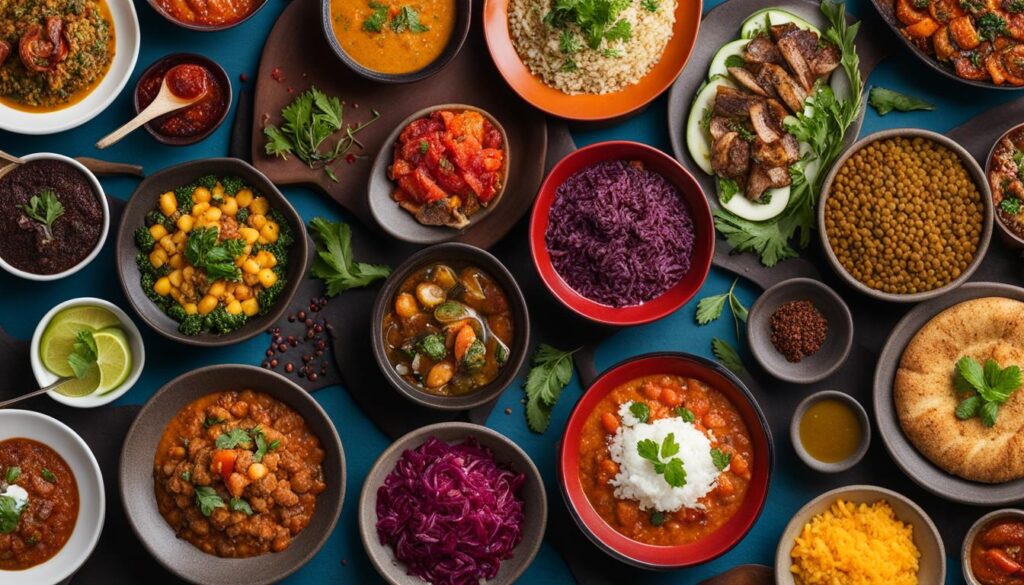
These are just a few examples of the famous Turkish food dishes that have captured the hearts and taste buds of people around the world. Each dish reflects the rich culinary heritage and diversity of flavours that make Turkish cuisine truly unique. Whether you’re enjoying a döner kebab on the streets of Istanbul or indulging in a sweet slice of baklava, these iconic Turkish dishes are sure to leave a lasting impression.
Traditional Turkish Recipes
Turkish cuisine is renowned for its rich flavours and unique combinations of herbs and spices. From hearty stews to savoury pastries, traditional Turkish recipes showcase the country’s culinary heritage. These authentic dishes have been passed down through generations, preserving the traditional flavours and cooking techniques that make Turkish cuisine so special.
One classic Turkish dish is “Manti,” which are small dumplings filled with seasoned ground meat and served with tomato sauce and melted butter. This dish is a labour of love, as each dumpling is carefully handcrafted and requires intricate folding techniques. The result is a delicious and satisfying meal that is often enjoyed with yoghurt and a sprinkling of sumac.
Another beloved Turkish recipe is “İmam Bayıldı,” which translates to “the Imam fainted” in English. This dish consists of eggplants stuffed with a mixture of onions, garlic, tomatoes, and herbs. The eggplants are then baked until tender and topped with olive oil. The story behind the name suggests that the Imam fainted upon tasting the dish because it was so delicious.
| Traditional Turkish Recipe | Description |
|---|---|
| Manti | Small dumplings filled with seasoned ground meat and served with a tomato sauce and melted butter. |
| İmam Bayıldı | Eggplants stuffed with a mixture of onions, garlic, tomatoes, and herbs, then baked until tender and topped with olive oil. |
Finally, no discussion of traditional Turkish recipes would be complete without mentioning “Baklava.” This sweet pastry is made by layering thin sheets of phyllo dough with a mixture of finely chopped nuts, sugar, and spices. The pastry is then baked to golden perfection and soaked in a sweet syrup made with honey or rose water. Baklava is a popular treat during special occasions and holidays, and its delicate layers and rich flavours make it a true indulgence.
These are just a few examples of the many traditional Turkish recipes that have stood the test of time. Each dish tells a story and represents the cultural heritage of Turkish cuisine. Whether you try them in a restaurant or attempt to make them at home, these authentic Turkish dishes are sure to delight your taste buds.
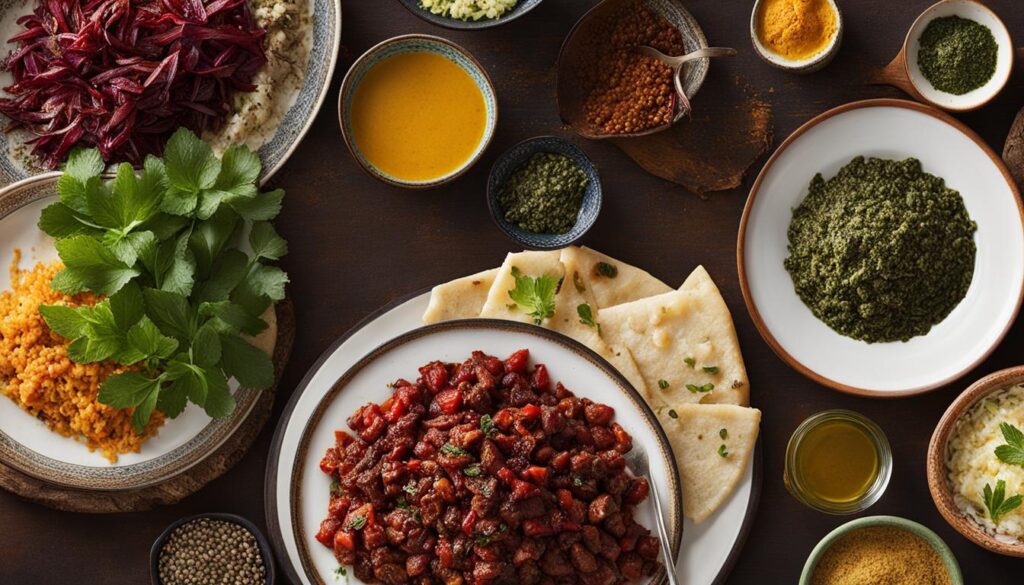
Exploring Turkish Street Food
Turkish street food is a delectable and vibrant aspect of the country’s culinary landscape. It offers a unique and immersive experience for both locals and visitors, allowing them to indulge in a variety of delicious and affordable dishes. From the bustling streets of Istanbul to the quaint towns of Anatolia, street food vendors can be found on every corner, enticing passersby with the tantalizing aromas and flavours of their creations.

Some of the most popular street food in Turkey includes the famous simit, which is a sesame-coated bagel-like bread that is perfect for a quick snack or breakfast on the go. Another must-try street food delicacy is gözleme, a thin and savoury stuffed flatbread filled with various fillings such as cheese, spinach, or minced meat. For the adventurous foodie, kokoreç is a unique dish made from lamb intestines, seasoned with herbs and spices and grilled to perfection.
“Turkish street food is a feast for the senses, offering a wide array of flavors and textures. The diversity and creativity of the dishes reflect the richness of Turkish cuisine.”
Street food vendors in Turkey take pride in their craft and often have secret family recipes that have been passed down for generations. They meticulously prepare each dish with love and care, ensuring that every bite is bursting with flavour. The popularity of Turkish street food can be attributed to its affordability, accessibility, and the fact that it allows people to experience the true essence of Turkish cuisine in its most authentic form.
So, if you find yourself wandering the streets of Turkey, make sure to immerse yourself in the world of Turkish street food. Whether you’re savouring a warm and crispy simit, enjoying a mouthwatering gözleme, or savouring the bold flavours of kokoreç, you’re sure to discover a whole new world of culinary delights.
Evolution of Turkish Cuisine Over Time
Turkish cuisine has undergone significant changes throughout history, reflecting the influences of various cultures and the availability of ingredients. The evolution of Turkish food is an intricate tapestry that weaves together the past and the present, showcasing the country’s rich culinary history.
Over the centuries, Turkish cuisine has been shaped by numerous factors, including trade routes, cultural exchanges, and historical events. The Ottoman Empire played a vital role in this evolution, introducing new ingredients and cooking techniques to the region. As the empire expanded, so did the diversity of Turkish cuisine, incorporating flavours from the Mediterranean, the Middle East, and Central Asia.
The changes in Turkish cuisine can also be attributed to the shift in societal structures and lifestyles. As urbanization took place, convenience and accessibility became important factors, leading to the emergence of street food culture. Turkish street food, with its vibrant and diverse flavours, reflects the dynamic nature of Turkish cuisine and its ability to adapt to changing times.
Today, Turkish cuisine continues to evolve, embracing modern gastronomic trends and fusion influences. Renowned chefs experiment with new ingredients and techniques, blending traditional flavours with international inspirations. This constant innovation ensures that Turkish cuisine remains exciting and relevant in the global culinary scene.
The evolution of Turkish cuisine is a testament to the country’s rich culinary heritage and its willingness to embrace change. Through its diverse flavours and vibrant food culture, Turkish cuisine offers a fascinating journey into the past while embracing the possibilities of the future.

Traditional Turkish Breakfast
Turkish breakfast, known as kahvaltı, is a delightful and indulgent morning meal that reflects the country’s love for fresh ingredients and communal dining experiences. It is a time for friends and families to gather around the table and enjoy a leisurely start to the day. Turkish breakfast dishes are known for their rich flavours and variety, offering a tempting array of options to satisfy every palate.
One of the popular choices for a traditional Turkish breakfast is menemen, a delicious scrambled eggs dish cooked with tomatoes and peppers. The combination of fluffy eggs and the sweetness of ripe tomatoes, along with the slight kick from the peppers, creates a harmonious flavour that is both comforting and satisfying. Menemen is often enjoyed with freshly baked bread, allowing you to soak up every last bit of the flavorful sauce.
Another classic dish that graces the Turkish breakfast table is sucuklu yumurta, fried eggs served with slices of spicy sucuk sausage. The succulent and aromatic sucuk adds a burst of flavor to the eggs, creating a mouthwatering combination that is sure to awaken your taste buds. This hearty breakfast option is often accompanied by a variety of cheeses, olives, and freshly squeezed orange juice, providing a balanced and nutritious start to the day.
A traditional Turkish breakfast is not complete without an abundance of cheese varieties and olives. The table is adorned with different types of local cheeses, such as beyaz peynir, a crumbly and slightly salty cheese, and kaşar, a semi-hard and mild cheese. These cheeses are often enjoyed with freshly baked simit, a sesame-encrusted circular bread ring that is both chewy and flavorful. Olives, both green and black, add a savoury element to the meal, offering a burst of briny goodness.
As you savour the delicious dishes that make up a traditional Turkish breakfast, you’ll experience the country’s culinary heritage and understand why it is considered a special and cherished meal. The abundance of flavours, the emphasis on fresh ingredients, and the joy of sharing the meal with loved ones create a memorable experience that will leave a lasting impression.
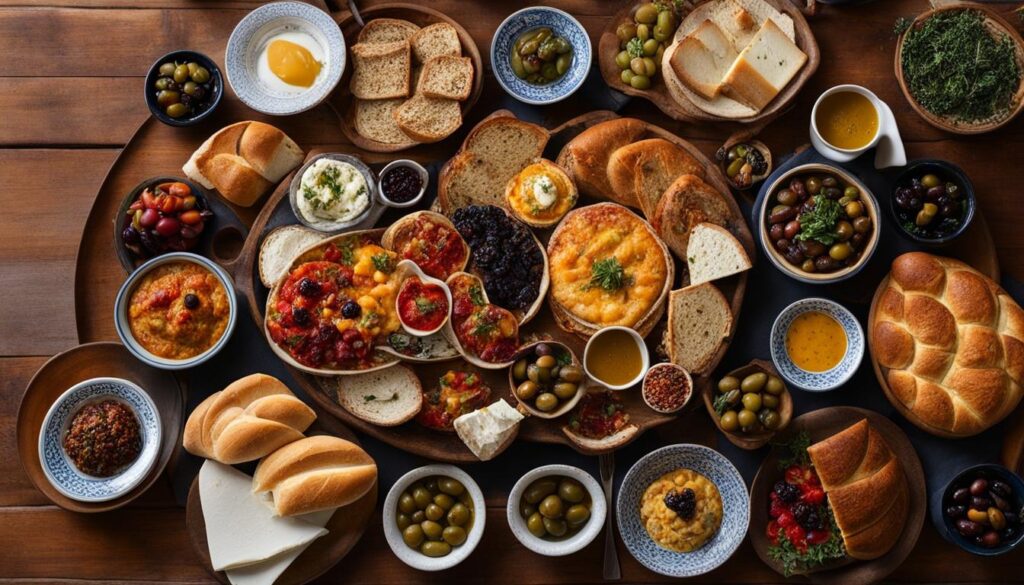
Traditional Turkish Breakfast
| Dish | Description |
|---|---|
| Menemen | A scrambled eggs dish cooked with tomatoes and peppers, offering a harmonious blend of flavours. |
| Sucuklu Yumurta | Fried eggs served with slices of spicy sucuk sausage, providing a burst of flavour to the meal. |
| Cheese and Olives | A variety of local cheeses, such as beyaz peynir and kaşar, accompanied by green and black olives. |
| Simit | A sesame-encrusted circular bread ring that is both chewy and flavorful, perfect for enjoying with cheese and olives. |
Conclusion
Turkey’s culinary history is a testament to the country’s rich cultural heritage and diverse flavours. Throughout the centuries, Turkish cuisine has evolved and adapted, taking influences from different regions and incorporating them into its traditional dishes. From the hunter-gatherer lifestyle of early settlers to the agricultural practices that shaped the food culture, Turkey’s food history is a fascinating journey.
Today, Turkish cuisine continues to thrive, offering a wide array of traditional dishes that showcase the authentic flavours and techniques of the country. From kebabs and börek to dolma and baklava, each dish tells a story of Turkish culinary heritage and the importance of fresh, local ingredients.
While embracing its roots, Turkish cuisine has also embraced modern gastronomic trends, blending traditional flavours with international influences. The fusion of old and new creates a culinary landscape that appeals to both locals and international visitors, with innovative cooking techniques and creative presentations.
Whether you’re exploring the traditional foods of Turkey, indulging in festive dishes, or experiencing the vibrant street food culture, Turkish cuisine is sure to leave a lasting impression. It is a celebration of flavours, culture, and shared dining experiences, making it one of the most beloved and significant culinary traditions in the world.
FAQ
What is the history of food in Turkey?
The history of food in Turkey can be traced back to the early settlers who relied on a hunter-gatherer lifestyle. As they transitioned to a settled life, agriculture became prevalent, leading to the domestication of animals and plants. The Middle East played a crucial role in the initiation of agriculture, and trade routes helped spread food culture to various regions.
How has Turkish cuisine evolved?
Turkish cuisine has evolved over centuries, influenced by factors such as trade, immigration, and cultural engagements with different regions. With the acceptance of Islam, the food culture in Turkey was reshaped, incorporating flavours from Europe, the Middle East, and Africa. Turkish cuisine is known for its use of agricultural products and meat, with meals varying based on the geographical regions.
What are some popular traditional foods in Turkey?
Some of the popular traditional foods in Turkey include kebabs, börek (savory pastries), dolma (stuffed vegetables), pilaf, and baklava. These dishes often feature a combination of flavorful herbs and spices, along with fresh ingredients sourced from the local regions.
What are some festive foods in Turkey?
Some of the popular festive dishes in Turkey include İskender kebab, a dish made with grilled meat served over bread and topped with tomato sauce and yoghurt, and işkembe çorbası, a tripe soup often consumed during New Year’s Eve celebrations. These festive foods hold cultural significance and are an integral part of Turkish culinary traditions.
What are modern gastronomic landscapes in Turkey?
In modern gastronomic landscapes, Turkish cuisine blends traditional Turkish flavours with international influences, creating unique fusion dishes. Contemporary Turkish food often features innovative cooking techniques and presentation styles, appealing to both locals and international visitors. Turkish gastronomy has gained recognition on the global stage, with renowned chefs utilizing local ingredients to create diverse and delicious dishes.
How important is local cuisine in Turkey?
Local cuisine in Turkey plays a significant role in both the cultural identity of different regions and the country’s tourism sector. Each region in Turkey has its own unique culinary traditions, reflecting the local ingredients and cultural influences. Tourists often explore different destinations in Turkey to experience the authentic flavours of local foods.
What are some famous Turkish food dishes?
Some of the iconic Turkish food dishes include kebabs, such as döner kebab and adana kebab, as well as Turkish delights, baklava, and Turkish tea. These dishes have become symbols of Turkish cuisine and are often associated with the country’s culinary heritage.
What are some traditional Turkish recipes?
Traditional Turkish recipes offer a glimpse into the rich culinary traditions of the country. From hearty stews like güveç to savoury pastries like börek, these recipes showcase the unique flavours and techniques used in Turkish cooking. Traditional Turkish recipes often utilize fresh ingredients and a wide range of herbs and spices, resulting in dishes that are both flavorful and satisfying.
What is Turkish street food?
Turkish street food is a vibrant and integral part of the country’s culinary culture. From simit (sesame bagels) to gözleme (stuffed flatbread) and kokoreç (lamb intestines), street food vendors offer a wide variety of delicious and affordable options. These street food delicacies allow locals and visitors to experience the authentic flavours of Turkish cuisine while exploring the bustling streets of cities and towns.



